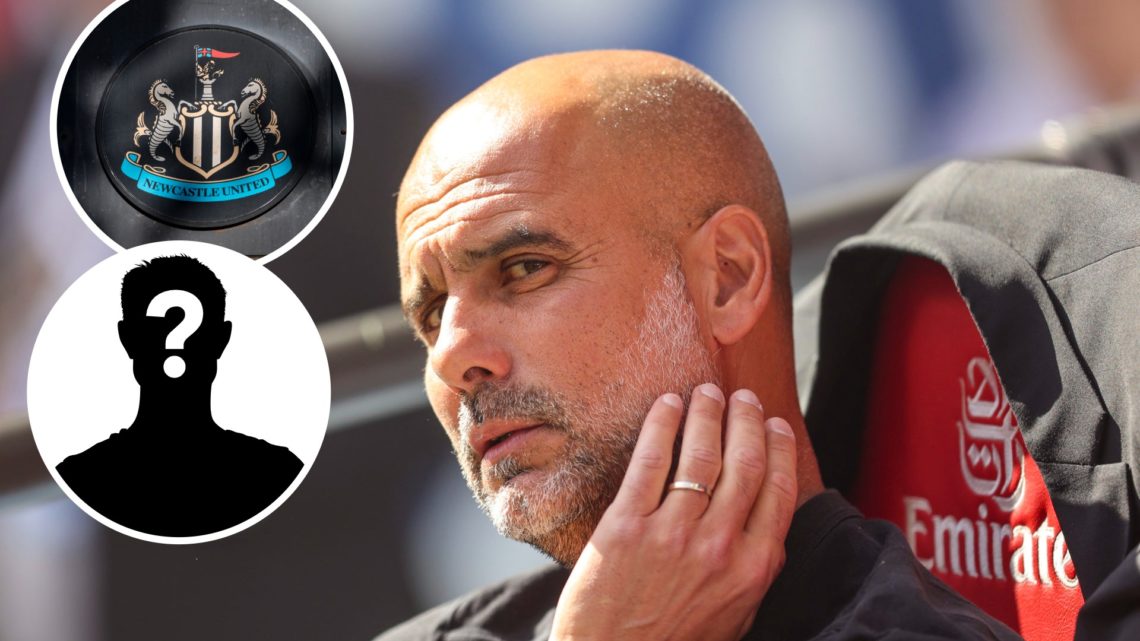Newcastle star’s head ‘turned by Man City’ with official bid coming

Manchester City’s growing confidence in their ability to secure the services of Tino Livramento represents more than just another transfer pursuit—it embodies a carefully orchestrated strategic vision that extends far beyond the immediate needs of Pep Guardiola’s squad. The Premier League champions are demonstrating their characteristic long-term planning approach, identifying and targeting players who can serve the club’s ambitions for years to come, even in the face of seemingly insurmountable obstacles.
The Citizens’ interest in the Newcastle United full-back comes at a crucial juncture in the club’s evolution. With the appointment of Hugo Viana as their new director of football, City have signaled their intention to continue their methodical approach to squad building, focusing on players who not only possess exceptional talent but also fit seamlessly into their philosophical framework. Livramento, at just 22 years of age, represents exactly the type of acquisition that has become synonymous with City’s transfer strategy—young, technically gifted, and possessing the adaptability required to thrive under Guardiola’s demanding tactical system.
Current Defensive Landscape at the Etihad
The current defensive configuration at Manchester City presents both opportunities and challenges that make Livramento’s potential acquisition particularly intriguing. Rico Lewis, despite his impressive development and technical abilities, remains relatively inexperienced at the highest level of professional football. While his performances have been encouraging, the demands of competing across multiple competitions throughout a grueling season require depth and quality that can only be assured through strategic recruitment.
Abdukodir Khusanov’s arrival in January has provided Guardiola with additional options, but his natural position as a center-back means his deployment at right-back represents more of a tactical adaptation rather than a natural fit. This temporary solution, while functional, lacks the specialized skill set that a natural full-back brings to City’s intricate passing combinations and overlapping runs that have become hallmarks of their attacking play.
The situation with Kyle Walker adds another layer of complexity to City’s defensive planning. The veteran defender’s return from his loan spell at AC Milan was always intended to be temporary, serving as a bridge while the club finalized their long-term plans for the position. Walker’s failure to secure a permanent move to Milan, despite initial optimism from all parties involved, has created a transitional period that requires careful management.
At 35 years of age, Walker’s desire for a new challenge is entirely understandable, and City’s willingness to facilitate his departure demonstrates their commitment to allowing players to pursue opportunities that align with their career aspirations. However, this also creates an immediate need for reinforcement in the right-back position, making the pursuit of Livramento even more pressing from a squad planning perspective.
The Livramento Profile: Why City See Him as the Solution
Tino Livramento’s journey through professional football reads like a case study in modern player development. His progression from Chelsea’s academy through Southampton and now to Newcastle United has been marked by consistent improvement and adaptability that mirrors the type of trajectory City value most highly in their recruitment process.
The young defender’s technical attributes align perfectly with the demands of playing in a Guardiola system. His comfort in possession, ability to contribute to build-up play, and understanding of positional requirements make him an ideal candidate for the role City envision. Unlike many modern full-backs who excel primarily in either defensive or attacking phases, Livramento has demonstrated the balanced skill set that allows him to contribute meaningfully in both areas of the game.
His pace and recovery ability provide the defensive security necessary to support City’s high defensive line, while his crossing ability and decision-making in the final third offer the attacking threat that has become essential for modern full-backs in elite-level football. These attributes, combined with his age and potential for further development, make him an attractive proposition for a club that prides itself on maximizing player potential through expert coaching and tactical sophistication.
Furthermore, Livramento’s experience in the Premier League cannot be understated. His familiarity with the pace, physicality, and tactical nuances of English football eliminates the adaptation period that often accompanies international transfers. This immediate availability for selection and contribution represents significant value for a club competing on multiple fronts throughout the season.
Newcastle’s Position: The Immovable Object
Newcastle United’s insistence that Livramento is “not for sale” reflects both their ambitions as a club and their understanding of the player’s value to their project. Under the ownership of the Saudi Public Investment Fund, Newcastle have transformed from a club fighting relegation battles to one with genuine aspirations for European competition and domestic success.
The Magpies’ position regarding Livramento extends beyond mere player valuation—it represents a statement of intent about their competitive aspirations. Allowing key players to depart for domestic rivals would undermine their credibility in the transfer market and signal a lack of ambition that could impact their ability to attract other top-level talent.
From Newcastle’s perspective, Livramento embodies the type of player around whom they can build their long-term project. His age profile, Premier League experience, and potential for improvement align with their vision of sustainable success built through smart recruitment and player development. Losing him to a direct competitor like Manchester City would represent not just a sporting setback but also a symbolic defeat in their efforts to establish themselves among England’s elite clubs.
The financial implications of any potential transfer also favor Newcastle’s position. With significant resources at their disposal, the club is not under pressure to generate funds through player sales. This financial stability allows them to set prohibitive valuations that reflect not just Livramento’s current value but also the premium required to compensate for strengthening a direct competitor.
City’s Strategic Approach: The Art of Persuasion
Manchester City’s confidence in eventually securing Livramento’s signature despite Newcastle’s public stance reflects their understanding of the complex dynamics that govern modern football transfers. The club’s approach appears to be multi-faceted, combining direct negotiations with efforts to influence the player’s perspective on his career trajectory.
The suggestion that City “believe they are turning the young defender’s head” indicates a sophisticated recruitment strategy that goes beyond simple financial incentives. The opportunity to work under Pep Guardiola, compete for the Premier League title, and participate in Champions League football represents professional opportunities that few clubs can match. For a young player with ambitions of reaching the highest levels of the game, these factors carry significant weight in career decision-making.
City’s historical success in similar pursuits provides them with confidence in their approach. The club has repeatedly demonstrated their ability to complete transfers that initially seemed unlikely, often through patient negotiation and the gradual application of various forms of influence. Their pursuit of players like Riyad Mahrez from Leicester City and Jack Grealish from Aston Villa followed similar patterns of persistent interest eventually resulting in successful acquisitions.
The role of Hugo Viana in this process cannot be understated. As the new director of football, his appointment represents City’s commitment to maintaining their competitive edge in the transfer market. Viana’s reputation for identifying and securing talented players provides additional credibility to their pursuit of Livramento, suggesting that this interest represents more than mere speculation.
Financial Considerations and Market Dynamics
The financial aspects of any potential Livramento transfer reflect broader trends in the modern football transfer market. Newcastle’s position as a club with significant financial resources means they can afford to hold out for valuations that reflect not just the player’s current worth but also the strategic disadvantage of selling to a competitor.
For Manchester City, the pursuit represents an investment in both immediate squad improvement and long-term planning. The club’s financial model has consistently demonstrated their willingness to pay premium prices for players who fit their specific requirements, viewing such expenditures as necessary investments in maintaining competitive advantage rather than mere transfer fees.
The complexity of modern transfer negotiations extends beyond simple purchase prices to include various performance-related clauses, future sale percentages, and other mechanisms designed to maximize value for all parties involved. These negotiations often take months to complete, with initial positions serving as starting points for extended discussions rather than final offers.
City’s approach to the Livramento pursuit likely involves multiple scenario planning, with different financial structures prepared depending on Newcastle’s responsiveness to various proposals. This flexibility in negotiation approach has historically served the club well in completing challenging transfers.
The Broader Context: Premier League Competition
The Livramento situation occurs within the broader context of increasing competition among Premier League clubs for elite talent. The financial resources available to multiple clubs have created a market environment where player acquisition requires not just financial commitment but also strategic thinking and competitive positioning.
For Manchester City, securing Livramento would represent more than squad improvement—it would demonstrate their continued ability to attract top talent despite increasing competition from other wealthy clubs. This symbolic value extends beyond the immediate sporting benefits to encompass broader considerations about the club’s status and attractiveness to future transfer targets.
The precedent established by this potential transfer could influence other similar situations, with clubs closely monitoring how successfully City navigate Newcastle’s resistance. Success in this pursuit could enhance their reputation for completing difficult transfers, while failure might embolden other clubs to adopt similarly uncompromising stances in future negotiations.
Tactical Integration and System Fit
From a tactical perspective, Livramento’s potential integration into Manchester City’s system represents an intriguing proposition for Pep Guardiola and his coaching staff. The Spaniard’s tactical flexibility and willingness to adapt formations based on available personnel suggest that Livramento’s arrival could influence broader tactical evolution within the team.
The young defender’s ability to contribute in multiple phases of play aligns with Guardiola’s preference for players who can fulfill various tactical requirements within the same match. His pace and defensive awareness provide security for City’s aggressive pressing system, while his technical abilities support their patient build-up play and positional rotation.
The potential for tactical innovation through Livramento’s inclusion extends to City’s attacking patterns, where his crossing ability and timing of forward runs could add new dimensions to their final-third creativity. These tactical considerations likely factor significantly into the club’s persistent interest despite the apparent obstacles to completing the transfer.
Conclusion: A Transfer Saga with Broader Implications
The Manchester City pursuit of Tino Livramento represents more than a simple transfer story—it embodies the complex dynamics that define modern football’s transfer market. City’s growing confidence despite Newcastle’s firm stance reflects their understanding of the various factors that influence player movement in contemporary football.
The outcome of this pursuit will likely influence future transfer negotiations involving similar circumstances, establishing precedents for how clubs with significant resources navigate competing interests and player preferences. Regardless of the eventual resolution, the situation demonstrates the sophisticated approaches required to succeed in modern football’s increasingly competitive transfer environment.
For both clubs involved, the Livramento situation represents a test of their respective ambitions and strategic approaches. City’s success or failure in this pursuit will provide insights into their continued effectiveness in the transfer market, while Newcastle’s ability to retain key players will demonstrate their progress in establishing themselves among English football’s elite institutions.
The resolution of this transfer saga promises to have implications extending far beyond the immediate parties involved, potentially shaping approaches to similar situations throughout the Premier League and beyond. As such, it deserves continued attention as a barometer of the evolving dynamics that govern modern football’s transfer market.















